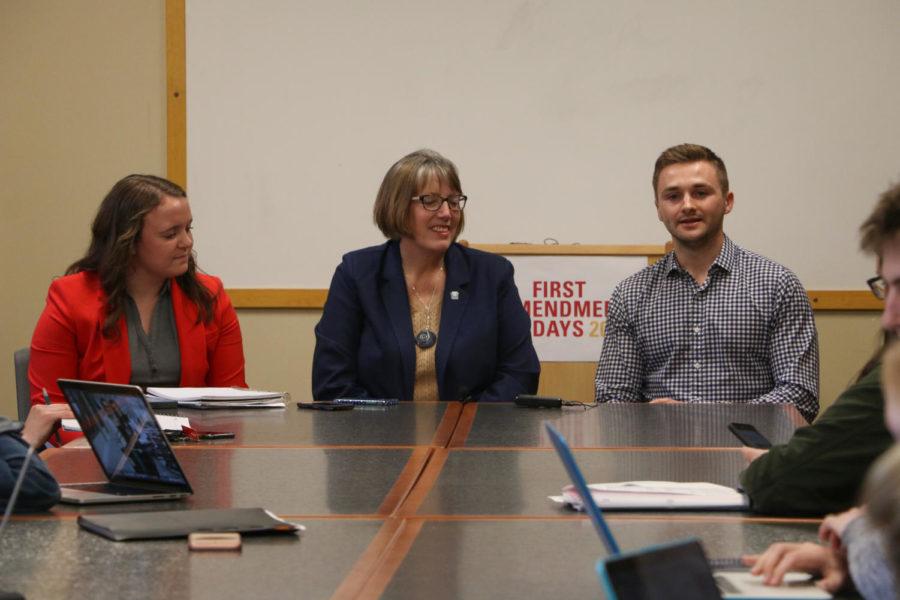First Amendment Day spotlights mental health awareness
Emily Blobaum/Iowa State Daily
Emily Barske, editor-in-chief of the Iowa State Daily; Kathie Obradovich, political columnist at the Des Moines Register; and Scott Moss, senior in finance and organizer of Iowa State’s Out of the Darkness walk, speak about mental health during a Depth and Dialogue session for First Amendment Day on April 11, 2018.
April 11, 2018
As efforts to facilitate more conversations on mental health are ongoing nationwide, the last afternoon panel on Wednesday did not avoid addressing the topic during this year’s First Amendment Day celebration.
The panel consisted of Kathie Obradovich, newly appointed opinion editor for the Des Moines Register and Greenlee school lecturer, Scott Moss, a senior in finance and organizer of the Iowa State’s “Out of Darkness” walk. The walk on March 24 has become the largest done at Iowa State and raised about $95,000 in their efforts.
Obradovich said that her involvement in writing about mental health began back in September when two of her friends lost their son to suicide. One of her friends, Mary Neubauer, vice president of external relations for the Iowa Lottery and former reporter for the Associated Press, wrote what Obradovich called a moving obituary for her son, Sergei.
Obradovich said that in the obituary, Neubauer discussed her son’s struggles with mental illness, stemming from her childhood in Russia prior to his adoption and coming to Iowa.
“I picked up [Sergei’s] story with ‘what should we do about this?’” Obradovich said about her column she wrote for the Des Moines Register. “My column focused on the fact that Iowa has some serious gaps in its facilities available to help people with mental illness.”
In Obradovich’s column, she called for a “First Step” forum, which was a gubernatorial forum that solely was dedicated to discussing mental health.
“We wanted to hear some plans for some serious issues,” Obradovich said. “The fact [is] that Iowa did not have certain types of facilities to help people.”
The forum Obradovich referred was held in December of 2017, at Des Moines University. Within two days, the 300 seated room reserved for the event was sold out and the forum was upgraded to a larger venue at the university.
Following the forum, Obradovich said that Gov. Kim Reynolds set aside room in her state budget to make mental health one of her top priorities.
There has also been an increase in lobbying efforts by organizations such as the Iowa Hospital Association, Iowa Nurses and others making mental health a priority.
“In just this last month, both the [Iowa] House and Senate passed some significant legislation unanimously,” Obradovich said.
Obradovich said that the one thing she took away from the experience how the media attention towards mental health could help encourage people share their own stories.
“I think it lead to an environment that people felt like they had to do this, they had to do something,” Obradovich said.
For the six months that was dedicated to planning the “Out of Darkness” walk, the one thing that Moss said that he took away from the experience was the support he and the other organizers saw for mental illness.
“Once you start the conversation, once you start getting people involved in the conversation and dialogue, it’s amazing how deep that can go and how quickly it go in a positive direction towards mental illness.” Moss said.
Moss said that the event was designed to be a campus wide event and not targeted to certain groups on campus.
“We really reached out to as many people as we could to let them know that this was a matter everyone should be talking about and everyone should be focused on,” Moss said.
Moss said that many people following the event approached him and other people on the the event committee to thank them for the event.
“It was a hard day for some people at that event,” Moss said. “Some of them didn’t know that their family and friends were struggling with mental illnesses or had in the past.”
Moss said that at the event there were “remember beads” that were provided which were different colored beads worn to symbolize themselves or others and their struggles with suicide or mental illness.
For Obradovich, she said that she was surprised by the emails and phone calls she received from people discussing their own or their relatives or loved ones experiences and that they wanted to enact change or to see how they could help.
“That encouraged us, by the amount of people reading or stories or writing to, to keep writing.” Obradovich said. “This was getting a ton of response and we also could see how we could make a difference.”
Obradovich said that Des Moines Register as a news organization had hoped to show that were a lot of public sentiments when it came to mental health concerns.
Obradovich said that the stigmas surrounding mental health was one of the barriers in discussing mental health.
She said that the stigma of mental illness along with substance abuse was a stigma that was persistent in Iowa.
“You could get some type of in-patient treatment for perhaps severe mental illness but as soon as substance abuse is apart of the picture, there is nothing,” Obradovich said.
Obradovich spoke of the importance having discussions around about how substance abuse is not a choice, but a disease, and that it can grow out of other mental illnesses.
Moss agreed with Obradovich’s statements and said how the committee created the beat the stigma hashtag and sold wristbands with the hashtag on it and raising awareness around stigmas.
“Being able to create those environments and start those conversations, is a step in the right direction to being able to overcome mental illnesses and things that go unattended,” Moss said.
Moss spoke of how using personal experiences was a way of opening up conversations about suicide and mental illness. Moss told those in attendance that his father died by suicide when Moss was 11-years-old.
Moss said that his father’s death was hard on his family and said that he was surprised that as he has gotten older, his father’s colleagues are more open to talking about his dad.
Moss’ father’s colleagues were unaware that their coworker had suffered from bipolar disorder and viewed him as one of the happiest individuals they’ve encountered.
“Suicide is something that can be preventable with the right conversation and with the right methods,” Moss said.
Obradovich said that for the media, its role is to educate about the situation of mental health in the state of Iowa and start conversations within communities throughout the state.
When asked about the proper way to cover suicide in the media, both panelists shared their thoughts.
Moss said that it is important to report the statistics and statistical evidence regarding suicide to make sure to not just report on one certain event and to provide some protection to the families impacted.
“It allows you to open up that conversation and to realize that it is a problem at Iowa State without singling out single events,” Moss said.
For the Des Moines Register, Obradovich said the discussion on coverage of suicide comes up regularly.
“The concern is that if you focus too much on the outpouring grief of someone who lost someone to suicide,” Obradovich said, “that level of attention makes suicide look like a good idea to other kids especially and there have been similar situations at Iowa high schools where there have been a rash of suicides.”
Obradovich said to avoid writing about suicide, instead writers are to make sure to write about resources for people dealing with depression and let them know where there is help.
Obradovich also said, for example with Sergei Neubauer, that personal stories tends to galvanize people.
“This personal story, putting a face to the issue, did help lead to action at the state house in a way that statistics might not have,” Obradovich said.
For Moss, small simple tactics were ideas he thought could help start up dialogue. His idea of genuinely asking people about their wellbeing and giving time to ask and talk to respectively acquaintances about each others’ well-being.
Moss also discussed that the walk will become an annual event on Iowa State campus and the social media committee for the event wants to create a social media campaign.
Seeing the success of the me too hashtag, Moss said the committee hopes that their campaign can be an opportunity for people to share their struggles with mental illness.
“It’s something that we are going to be working with to try and promote the event next year and mental health awareness next year,” Moss said.
For getting involved, Obradovich spoke of the importance of knowing the resources that are available. She said that for the Des Moines Register, their go-to resource is National Alliance on Mental Illness.
Moss encouraged for people to get involved in clubs on campus, or even just directing people to Student Counseling Services and Student Wellness services website as an in-person and online resources for people.
From Obradovich’s words, she hoped what attendees would take from her would be is to become a registered voter.
“A lot of what needs to happen right now is under the control of state and local goverment,” Obradovich said. She said that with the bills passages from the legislative session this year, there is not enough sustainable money to fund the progress made.
Since starting to teach at Iowa State, Obradovich said that she has realized that the need is great at Iowa State and that the mental health awareness need may not be fully recognized at Iowa State yet.
“I worry with the state cutting universities budgets, I worry that it will be harder to keep up with the need here at Iowa State,” Obradovich said. “Whether we are as a university doing enough to make sure our students are feeling comfortable enough to disclose what they’re going through and also finding the right help here on campus.”







